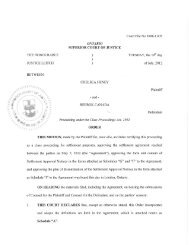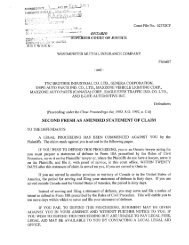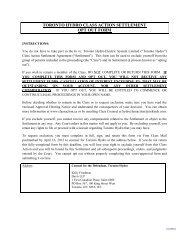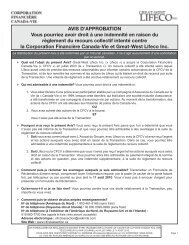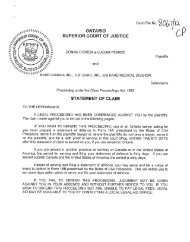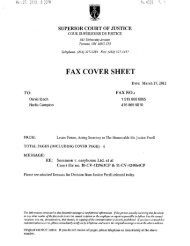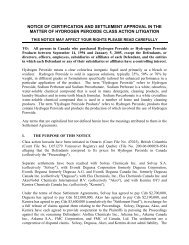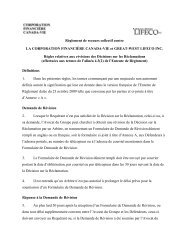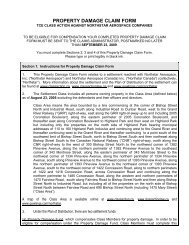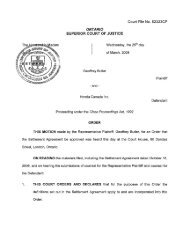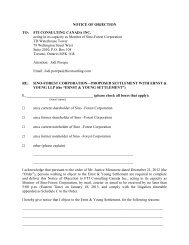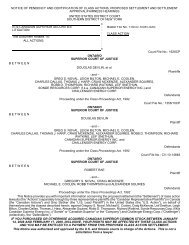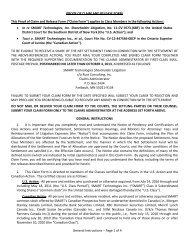Gariepy v. Shell Oil Co. - Classaction.ca
Gariepy v. Shell Oil Co. - Classaction.ca
Gariepy v. Shell Oil Co. - Classaction.ca
You also want an ePaper? Increase the reach of your titles
YUMPU automatically turns print PDFs into web optimized ePapers that Google loves.
the issues raised by each member's claim be better accomplished through the class proceeding orwould they be better accomplished through other mechanisms such as joinder, test <strong>ca</strong>ses or simplyby allowing each claim to proceed individually. 72 The plaintiffs assert that the onus is on the defendants to show that there is a better way toresolve the common issues before this court <strong>ca</strong>n conclude that a class proceeding is not thepreferable procedure for the resolution of the common issues. I do not accept that there is such an"onus" on the defendants. There is, of course, the obligation that rests on all parties in every <strong>ca</strong>seto put all relevant evidence before the court that will assist in the proper determination of the issuesraised. But insofar as the issue of onus is concerned, in my view it rests at all times on the plaintiffsto satisfy the court that the requirements of section 5(1) of the Act have been met. In other words,the plaintiffs <strong>ca</strong>nnot avoid satisfying the requirements for certifi<strong>ca</strong>tion merely by suggesting that thedefendants have failed to propose a viable alternative. Presumably the court would only beconcerned that a class action was not the preferable procedure for the resolution of the commonissues in situations where it could identify other avenues of recourse for the members of the putativeclass. That said, however, the absence of a solid and detailed alternative plan from the defendants<strong>ca</strong>nnot constitute a class action as the preferable procedure by default. 73 In my view, given the breadth of the issues that are left to be determined outside of the commonissues, the determination of the identifiable common issues through a class action is not thepreferable procedure. In this regard, this <strong>ca</strong>se is more akin to Hollick v. Toronto (City), supra, thanit is to Rumley v. British <strong>Co</strong>lumbia, supra. In Rumley, the determination of systemic negligencewould have left the members of the class only with the requirement of establishing the fact of theabuse and the injuries that flowed from it. In that sense, the members of the class in Rumley wouldbe left, in essence, with only having to prove their damages. Here, however, as I have alreadymentioned, the members of the class would still be left with many hurdles to overcome on theliability issue alone. 74 In this <strong>ca</strong>se, as in Hollick, I am not satisfied that the determination of the identifiable commonissues satisfies any of the three advantages of class actions. First, it is apparent to me that judicialeconomy will not be achieved through a determination of the identifiable common issues. As I havealready said, there are so many issues which remain to be determined after any common issues areresolved before liability <strong>ca</strong>n be found against either of these defendants, there are still going to haveto be innumerable proceedings undertaken. Second, I am also not satisfied that the denial ofcertifi<strong>ca</strong>tion will <strong>ca</strong>rry with it a denial of access to justice. In this regard, it is worthy of note thatnotwithstanding the apparent inability of plaintiffs in the United States to obtain certifi<strong>ca</strong>tion of aclass action, either nationally or on a state-wide basis, there have nonetheless been settlementsreached of claims both through settlement classes and through voluntary resolution proceduresundertaken by the defendants. Third, as I have also already mentioned, it does not appear that anyfurther behaviour modifi<strong>ca</strong>tion will be achieved through a class action here. The products concernedhave long since been removed from the market and, through the settlement procedures in the UnitedStates that I have already mentioned, it appears that these defendants are already having to bear thecosts of their conduct. 75 Before leaving this point, I will acknowledge that the determination of punitive damages wouldappear to be one that would be justified on a class-wide basis. What the defendants knew about theirproduct and what they did with that information <strong>ca</strong>n be determined without any involvement of the



